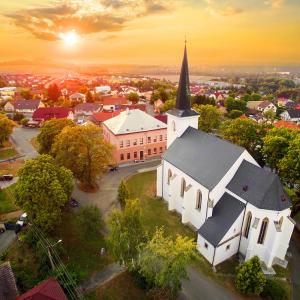Cathy Lynn Grossman is a senior national correspondent for Religion News Service, specializing in stories drawn from research and statistics on religion, spirituality, and ethics.
Posts By This Author
Most Americans Oppose LGBT Discrimination, New Survey Finds

Image via Public Religion Research Institute
Most Americans oppose religious exemptions to LGBT non-discrimination laws, according to a new survey. The report comes as a raft of bills before state legislatures would allow people to refuse service or accommodations to gays, lesbians, bisexual, and transgender people based on their religious beliefs.
Politics Divides American Views of Muslims, Islam
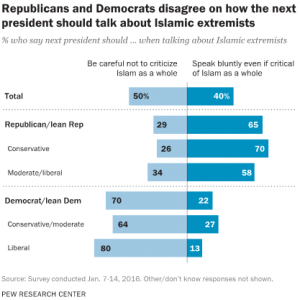
Image via Pew Research Center
Republicans and Democrats divide sharply over views on Islam, Muslims, and how a U.S. president should label violent extremists. But Americans overall agree there’s a “a lot” of discrimination against Muslims living in the United States — and it’s rising — a new Pew Research survey finds.
Republican Protestant Pastors Really Aren't Interested in Voting for Trump

Photo via a katz / Shutterstock.com
Donald Trump, who loves to call others “losers,” is a big one himself in a new survey of U.S. Protestant pastors.
When LifeWay Research, an evangelical polling group, asked Republican pastors in mid-January who their pick would be if they were voting that very day, Trump was named by only 5 percent.
“Undecided” was the big winner with more than a third of GOP pastors (39 percent) in the survey. Indeed, 48 percent overall said they had no top choice in this “bizarre election season,” said LifeWay Research executive director Ed Stetzer.
GOP Debaters Will Keep Iowa's Evangelicals in Mind, But the 'Nones' Are a Growing Force
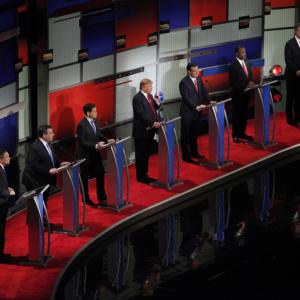
Image via REUTERS/Randall Hill/RNS
The run-up to the Feb. 1 Iowa caucus has shifted from who is toughest on ISIS or immigration or Obamacare to an all-out scramble to court evangelicals — an estimated 60 percent of Republican caucus likely voters. However, a new report from the Public Religion Research Institute shows that evangelicals may be sharing their November election clout with a different voting bloc. PRRI found about one in four Iowans identify as evangelical but a similar percentage say they have no religious identity, the nones.
NFL Violence and High School Prayers OK With Football Fans

C.J. Anderson (22) and Lawrence Timmons (94) in the AFC Divisional playoff. Image via Mark J. Rebilas/USA TODAY/REUTERS/RNS
For all the headlines about football violence, concussions, and player injuries, watching football is not a “guilty pleasure” for many Americans. It’s just a pleasure, a new survey finds. The Public Religion Research Institute/Religion News Service survey, released Jan. 28, also found overwhelming support for “allowing football coaches at public high schools to lead their players in specifically Christian prayer during games.”
Homeless Baby Born on Street Embraced by Pope's Charity
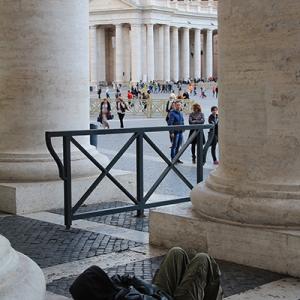
Image via Josephine McKenna/RNS
Pope Francis’ outreach to the homeless with showers, shelters, and other services may have its youngest beneficiary — an infant born on a street near St. Peter’s Square. A homeless woman gave birth on a cardboard box mere yards from the Vatican on Jan. 20 in near-freezing temperatures, according to Reuters.
'I Will Protect Christians,' Donald Trump Tells Students at Liberty University
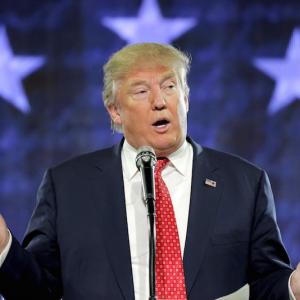
Image via REUTERS/Joshua Roberts/RNS
Just weeks before the Iowa caucus, GOP presidential contender Donald Trump is aiming his proudly “politically incorrect” anger and his pledge to be “great!” directly at evangelical Christians. “I’m going to protect Christians,” who are losing their power in American society, he said Jan. 18, addressing 100,000 Liberty University students — packed in the Lynchburg, Va., campus sports arena or viewing online.
GOP 2016 Contenders Debate Again Jan. 14, Praying for Devoted (and Devout) Viewers
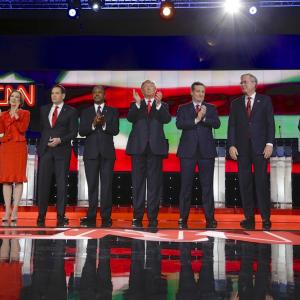
Image via Joseph Sohm/Shutterstock.com
Only seven contenders will be on the main stage for Fox Business News’ broadcast of the sixth GOP 2016 presidential debate Jan. 14 — almost all well-known for taking strong stands on faith in hopes for a boost from devoted viewers. The December debate was the third-most-watched one in debate tracking history, according to CNN. The theme of this week’s debate will be economic policy, with managing editor for business news Neil Cavuto and global markets editor Maria Bartiromo asking questions.
2015 Was 'Worst Year' for Christian Persecution, Says Open Doors
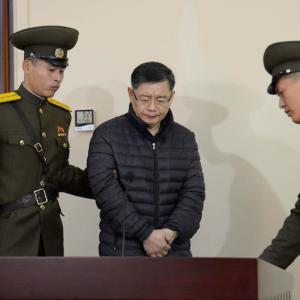
Hyeon Soo Lim on trial in North Korea. Image via Reuters/RNS
With North Korea leading the way and Islamic extremism rapidly expanding, 2015 was the “worst year in modern history for Christian persecution,” according to a group tracking this issue.
Why Do Pastors Quit? New Survey Provides Answers
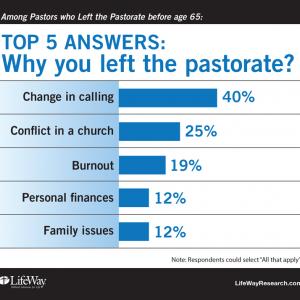
Image via LifeWay Research/RNS
Sometimes a call from God is not enough to keep a pastor in his post.
Many evangelical pastors who quit before retirement age found “another calling” either off the pulpit or out of ministry altogether. But many also say they were driven away by conflict and burnout. So says a new survey of former pastors from four denominations.
Why Some Smaller Churches Thrive Despite the Odds
More people in the pews, more energy for programs, more funds to maintain the roof — these are all keys to survival for such small congregations, according to the latest Faith Communities Today report, released Jan. 4 by the Hartford Institute for Religion Research.
It finds that congregations with fewer than 100 in weekend attendance — the most vulnerable to collapse — rose to 58 percent in 2015, up from 49 percent five years ago.
Yet the report is optimistically titled: “American Congregations 2015: Thriving and Surviving.”
Trump Ties Pope Francis As Second ‘Most Admired,’ Behind Obama
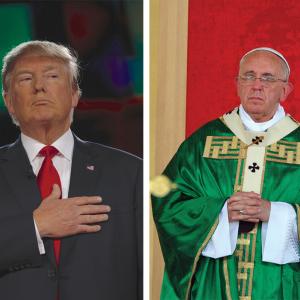
(left) Donald Trump at the CNN Republican debate Dec. 15 in Las Vegas. Joseph Sohm / Shutterstock.com. (right) Pope Francis celebrates Mass on June 21 in Turin, Italy. miqu77 / Shutterstock.com
Americans’ most admired man and woman in the world are — once again — President Barack Obama and former Secretary of State Hillary Clinton.
But the shocker in the Gallup Poll’s Most Admired List released Monday may be the No. 2 spot in the survey, where Donald Trump tied Pope Francis in the year the pontiff visited this country for the first time.
O Come to Church All Ye Faithful, Sort of Faithful, and Atheists, Too

Image via LifeWay Research / RNS
December means curtains up for church Christmas pageants, hand-bell concerts, caroling kiddie choirs, and Nativity displays on the front lawns.
But the No. 1 reason most U.S. adults — Christians and many unbelievers, too — give for going to church at Christmastime is to “honor Jesus,” according to a new survey from the evangelical research agency LifeWay Research.
More than three in four of churchgoers (77 percent), Protestants and Catholics alike, said they were drawn to attend church to honor the birth of their savior, the fundamental religious experience of Christmas above and beyond all the seasonal fa-la-la-la-la.
The Megachurch Boom Rolls On, But Concerns Are Growing Too

Image via Leadership Network / RNS
Change is coming to American megachurches — those behemoths for believers that now dot the religious landscape.
There are more participants in megachurch worship than ever.
“Last weekend 1 in 10 adults and children who went to a Protestant church went to a megachurch — about 5 million people,” said Warren Bird, director of research for Leadership Network and co-author of a megachurch study released Dec. 2.
But individual attendance is down to once or twice a month — or less.
Lots of God Talk as GOP Contenders Prep for Debate

Image via Lucy Nicholson / REUTERS / RNS
Oct. 28 is the third debate for the Republicans, and since their last stage appearance, several have been ringing the religious liberty bell from one primary state to the next.
CNBC, which is hosting this debate, says the focus will be on economic issues when the mikes turn on at Coors Events Center at the University of Colorado in Boulder.
But that doesn’t mean God talk will be muted. Didn’t Pope Francis just sweep through, telling U.S. leaders about the moral dimensions of public policy?
Sister Joan Chittister, the Dissident Nun, Shares Her Secret Life
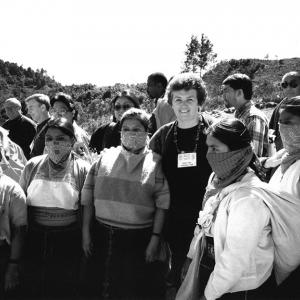
Sister Joan Chittister, center, in Chiapas, Mexico. Image via Benedictine Sisters of Erie, Penn. / RNS
Veteran Catholic writer Tom Roberts thought he knew Sister Joan Chittister — the maverick Benedictine nun who dares speak her mind to her church.
He didn’t.
When Roberts, editor at large for the National Catholic Reporter, went to interview her three years ago in Erie, Pa., at the community where she entered religious life at age 16, a secret she’s held for a lifetime came to light.
Do You Think Science and Religion Conflict? Probably Not, if You're Highly Religious
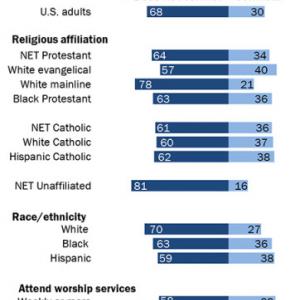
Image via Pew Research Center / RNS
Most Americans see a conflict between the findings of science and the teachings of religion.
But “see” is the operative word in a new Pew Research Center report issued Oct. 22.
Examining perceptions leads to some unexpected findings.
While 59 percent of U.S. adults say they saw science and religion in conflict, that drops to 30 percent when people are asked about their own religious beliefs.
It turns out that the most highly religious were least likely to see conflict.
Will Democrats Play the God Card at Their Debate?

Image via REUTERS / RNS
Democratic contenders in the 2016 presidential election take their turn at the debate lecterns Oct. 13, and it’s anyone’s guess if it will be a battle of contesting moral visions or a policy snooze-fest.
Under the CNN stage lights: social-gospel Methodist Hillary Rodham Clinton; secular Jew Bernie Sanders; loud and proud Catholic Martin O’Malley; and two Protestant men who rarely speak from the faith angle — Jim Webb and Lincoln Chafee.
View of Catholic Church Improved After Pope Francis' Visit
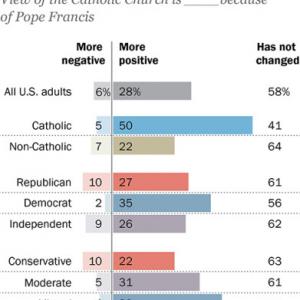
Image via Pew Research Center / RNS
Pope Francis’ first U.S. visit gave his already-high favorability ratings only a modest bounce with most Americans — and no bounce at all among Catholics.
Yet his three-city September tour — from Congress to the United Nations and from cathedrals to a prison — generated significant goodwill toward the Catholic Church, according to a new survey by the Pew Research Center.
Pew’s survey, conducted just days after the pope returned to Rome, was released Oct. 7 and offers a snapshot of his initial impact.
The top finding: “Four times as many U.S. adults say their opinion of the Catholic Church is better now because of Pope Francis as people who say their impression has gotten worse,” said Greg Smith, associate director of research and co-author of the report.
Religious or Not, Many Americans See a Creator's Hand
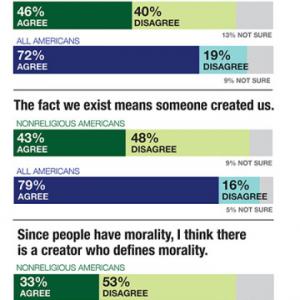
Image via LifeWay Research / RNS
You don’t have to believe in God or identify with any religion to see a creator’s hand in human life and morality, suggests a new survey.
LifeWay Research’s overall finding — that most Americans believe there is a creator who designed the universe and defines human morality — is not surprising. After all, 3 in 4 U.S. adults identify with a religious denomination.
The surprise is that so many people who don’t identify with a religion — so-called nones — agree.
